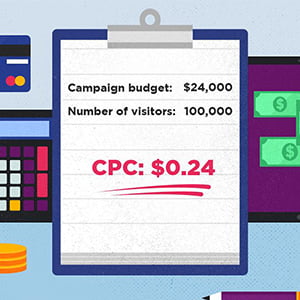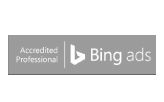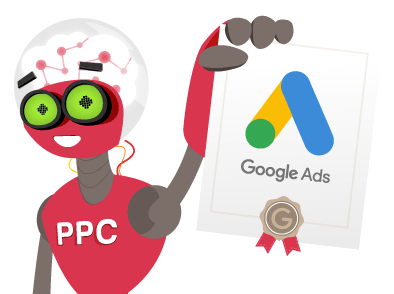There’s definitely an art to putting together an effective PPC ad campaign, but that doesn’t mean there aren’t some simple black and white things you can do to make sure your campaign is running as smoothly as possible. In fact, one of the best things you can do is use a PPC checklist to stay on top of things.
A common misconception about PPC advertising is that you can just create an ad campaign and sit back and wait for it to take off. This is far from the truth, and that mentality can lead to hemorrhaging money with little to no return.
There are things you should be doing—on a weekly and monthly basis—to optimize the effectiveness of your PPC ads. Let’s take a look.
Weekly PPC Checklist
1. Check Your Budget Versus Conversions

Checking your budget is a great way to stay on top of things so that there are no surprises down the line.
Two of the most important things to keep track of are how much you’re spending on ads versus how much revenue they’re bringing in. By checking these two things, you can pick up on any changes as they happen before you lose a lot of money or miss an opportunity.
Yes, you want to make money. And, yes, you’re going to see ups and downs in both how much you’re spending and how much you’re bringing in. But any drastic changes could indicate a need for action. Maybe you put up a new ad and it’s getting a lot of clicks – but no conversions and you’re losing a lot of money. Or, maybe it’s doing much better than you thought it would and you’re missing an opportunity to increase the budget for more visibility. When you check weekly, you make sure you don’t miss anything big, good or bad.
2. Check Your Bid Strategy

If you’re not getting enough impressions, ask yourself, why? Are your ads getting beat out by someone who is bidding higher? Or is it something else? Which leads us to our next point…
3. Check Your Keywords
On the other hand, if you find that one is overperforming, consider building a new ad around it with its own budget. If it’s doing significantly better than all the other keywords in the ad group, it no longer belongs there.
At least once a week, you should identify what your top keywords are and make sure they’re managed correctly. There are two reasons for this. One, these are the keywords that are most likely to generate revenue. Two, they also cost you the most money. Remember, you’re paying for every click, so make sure you’re managing the keywords that are getting you those clicks the right way.
Also, make sure you look at the search terms that got you clicks. Are there any relevant ones that you missed? Are there any that are getting you a lot of clicks but no conversions because they’re actually unrelated to your site? Billions of searches are done on Google every day, so it’s not uncommon for your ad to show up in an unrelated search. But that doesn’t mean you shouldn’t try to find any obvious reasons for this and try to change them.
Every Other Week or Monthly PPC Checklist
While these tasks don’t need to be done every day, they do need attention at least once—or, ideally, a few times—per month.
1. Go Deep on Keywords

If you’re checking your keyword performance often, it should be easy to identify which keywords are worth your time. Dig into web analytics to determine what keywords to get rid of. For example, a keyword that gets visitors to your landing page without any further engagement or conversion isn’t really performing. Determine if there’s anything you can do to tweak its performance. If not, pause it or remove it altogether.
2. Review Every Campaign
The best way to put out an effective ad is to tweak it until it hits a nerve with the right people. A good way to do this is to run multiple versions of every ad. If you can’t afford multiple versions, make sure you have at least two so you can compare their performance. Use different ad copy on each one and determine which ad is getting you the most clicks and conversions. When you have enough data, you can determine what’s working and what isn’t.
Ad copy is so important, especially in most PPC ads where you only have a limited amount of space to get your business out there. Take time creating multiple versions of what you want to say and make every attempt to target them to the people you want to reach.
This takes time, though. You have to wait until each ad gets enough impressions to really make the call. Still, it’s important to stay up to date on progress so you don’t miss a window of opportunity. You should review your campaigns at least twice a week.
3. Test Landing Pages
This is so important but is so easy to overlook. It doesn’t do you any good if you have an effective ad that leads people to a landing page that isn’t working properly. If you notice an ad is getting a lot of clicks, but conversions have pretty much stopped, it could come down to a problem on the landing page.
Check everything. Make sure it looks all right superficially, that photos are loading properly and the layout looks good on both the desktop and mobile versions of the site. Check the links to be sure they’re all working, and make sure any forms you have on the page are loading properly. If you have an offer that’s supposed to pop up – say, a coupon code for people who aren’t engaging – make sure it’s working the way it’s supposed to. It would be a shame to have a well-thought-out landing page that isn’t doing what it was designed to because of a broken link or image that failed to load.
How Does This Convert More Customers?
A big thing to keep in mind about PPC advertising is that you’re not just trying to attract people to your website – you’re trying to attract the right people. By spending the time monitoring budget, keywords, clicks, and conversions, you can figure out what is and isn’t working with the right people, why the wrong people are clicking on your ads, and the keywords, ad copy, and budgets you need to tweak to change things.
- How much are you spending?
- How much are you earning?
- Are you losing money on a lot of clicks with no conversions?
- Is something working well that should have more money thrown behind it?
- Did any ad or keyword reach a budget max?
- Are you spreading your budget appropriately across bidding?
- Are any not performing?
- Are there any performing exceptionally well that can be broken out into their own campaign?
- Are top keywords being managed correctly as far as budget spend versus conversions?
- Are you getting enough impressions?
- Are you being outbid?
To stay on top of things, make sure you check the following at least twice a month:
- Go deep on keywords.
- What do the analytics say is working?
- What isn’t working?
- Can underperforming words be saved, or is it time to pause them or get rid of them altogether?
- Review every campaign.
- Do you have at least two versions of each running with different copy?
- Is one version performing better than the other? If so, why?
- Does your copy attract the right people?
- What does the data say?
- Test your landing page.
- Are images loading properly?
- Do links work?
- Are pop-ups or offers working as they should?
- Are the desktop and mobile versions both loading correctly?
Again, it’s worth noting that PPC advertising is not set-it-and-forget-it. To have a successful campaign, you have to know what’s working and what isn’t. The sooner you catch a problem, the sooner you can fix it, and the sooner you find out that something is working, the sooner you can make the most of it.
While this might seem a little overwhelming, it’s a little easier when you can break it down into a list. The big takeaway here is that you should always be collecting data and making changes based on that data. By doing something as often as possible, you can ensure you’re continuously optimizing.










